Juventud Rebelde 221
Nicaraguan gov’t thanks Bishops Conference

Nicaraguan government thanks Bishops’ Conference for mediation
Previously, the Episcopal Conference had accepted in a communiqué the role of mediator and witness of the dialogue proposed by Ortega, faced with the situation of violence experienced in recent days in the country.
Published: Wednesday 25 April 2018 | 09:57:14 AM
By Juventud Rebelde
digital@juventudrebelde.cu
A CubaNews translation.
Edited by Walter Lippmann.
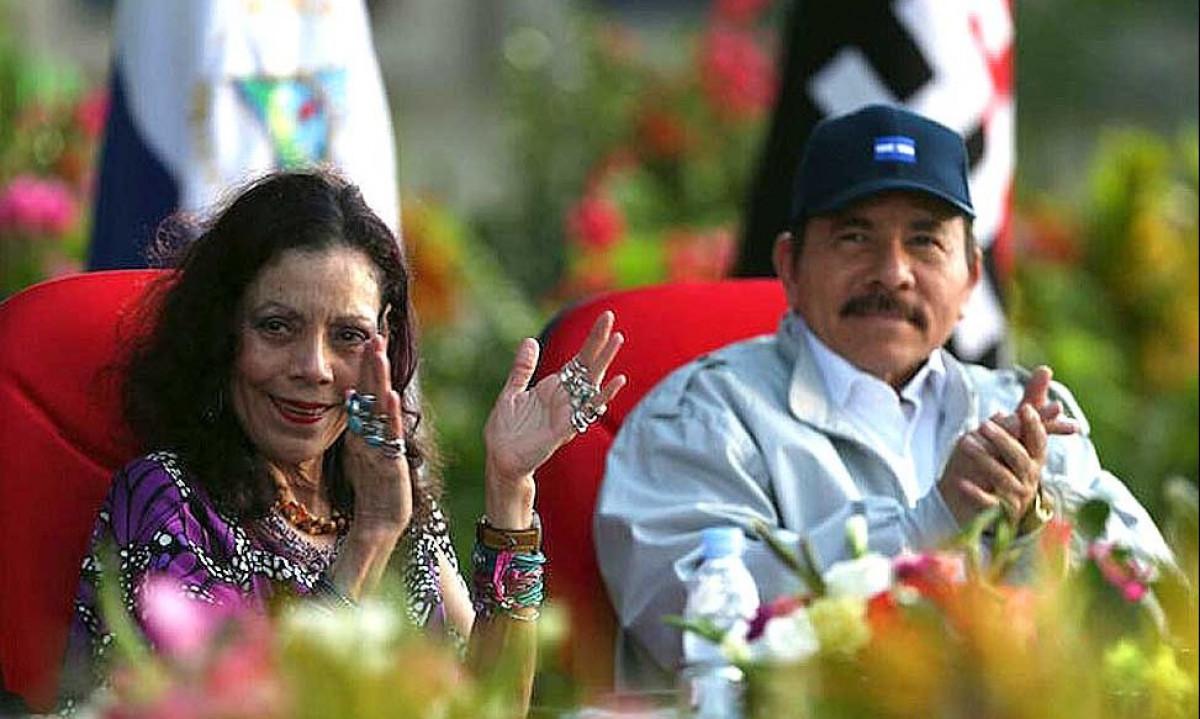
The President and Vice President of Nicaragua sent a message of congratulations to Raúl and Díaz-Canel. Author: La Voz del Sandinismo Published: 20/04/2018 | 04:53 pm
MANAGUA, April 24.- The Government of Nicaragua thanked the Episcopal Conference on Tuesday for its willingness to participate as a mediator and witness to the dialogue convened by the President of the Republic, Daniel Ortega, to restore order and peace in the country.
We are deeply grateful for the willingness of Cardinal Leopoldo Brenes and all the bishops to continue to contribute to the meeting, tolerance and peaceful coexistence in our country, according to PL.
The text, read by the Vice-President, Rosario Murillo, also fully shares the proposal of sectors that could participate in the national dialogue sessions, in addition to others.
“Once again, our gratitude, on behalf of the Nicaraguan families and the Government of Reconciliation and National Unity, for their willingness to participate as mediators and witnesses in these important events in Nicaragua’s present history,” the message underscores.
Previously, the Episcopal Conference had accepted in a communiqué the role of mediator and witness of the dialogue proposed by Ortega, faced with the situation of violence experienced in recent days in the country.
On Sunday, the president invited Cardinal Brenes and a delegation of bishops to accompany the dialogue by announcing the repeal of the social security reforms that, he said, served as a trigger for the violence.
In the last few days, Nicaragua experienced great social tension, unprecedented in more than a decade.
It all began when protests against the aforementioned reforms were infiltrated by alleged criminal groups and vandals incited by the right wing for general anguish and instability in the country, according to reports.
In an appearance before the people, Ortega recognized the minority’s right to criticize, but not to conspire to destroy, promote violence, and worse still, to seek out the most extremist and racist political groups in the United States to finance destabilization plans.
Nicaragua: The New Prisoner

Nicaragua: The New Prisoner
Like a herd of hungry wolves, hemispheric organisms of different stripes, but of the same kind, open their jaws and throw their claws at the violent events that have taken place in Nicaragua.
Posted: Saturday 28 April 2018 | 08:39:57 PM
 By Marina Menendez Quintero
By Marina Menendez Quintero
marina@juventudrebelde.cu
A CubaNews translation.
Edited by Walter Lippmann.
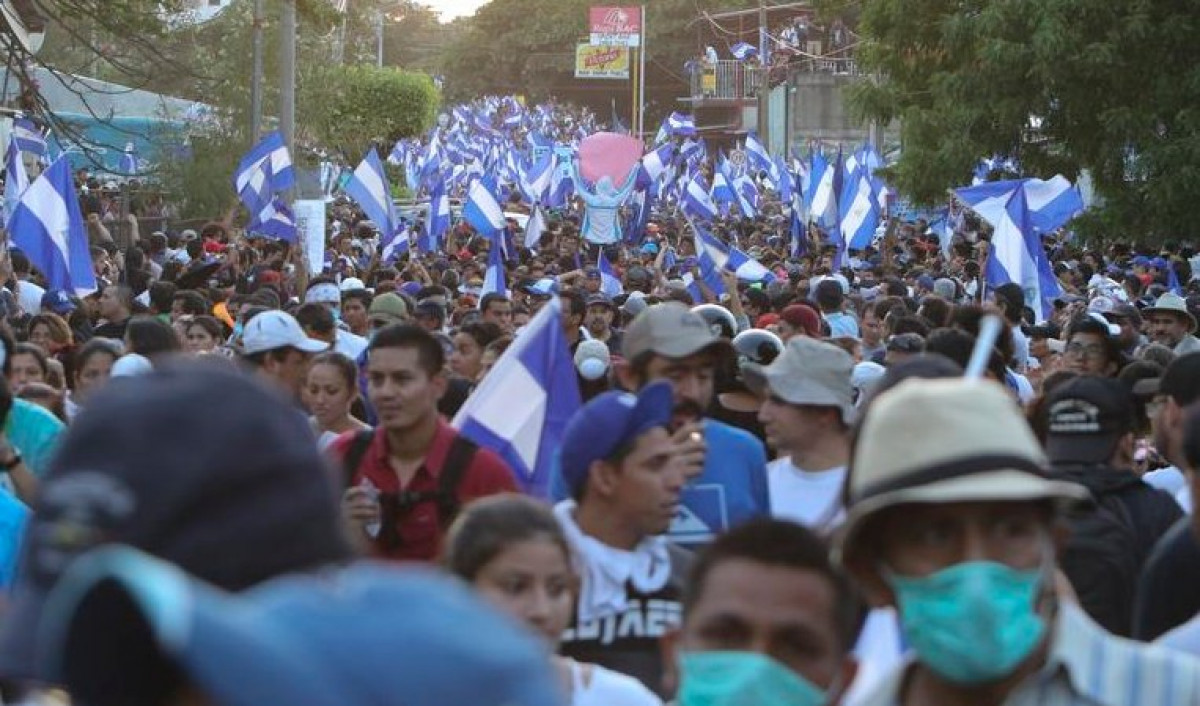
A march for peace, last Monday, extended over 6.5 kilometers in Managua, the capital Author: El Nuevo Diario Published: 04/28/2018 | 08:01 pm
“The herd” is a term coined in Spain these days that identifies, in an incriminating tone, a group of five young men who are accused of raping a girl… even though they have been tried and convicted by the courts for violence alone.
They could have been christened with that nickname because of the way they acted, like wolves in a group. Or by force.
Thus, like a herd of hungry wolves, hemispheric organisms of a different stripe, but of the same kind, open their jaws and throw their claws at the violent events that have taken place in Nicaragua.
Their very identification gives rise to conjecture about the sincerity of their concerns, and allows them to guess what it is that they crave.
The biased Humans Right Watch already calls for a meeting of the Permanent Council of the OAS, so that the presence of a representative of the draft Inter-American Commission on Human Rights may be applied to Nicaragua.
IDEA – the so-called Democratic Initiative of Spain and the Americas, which brings together former right-wingers, conspirators and interferers – also called on the head of the OAS, the discredited Luis Almagro, to promote the adoption of measures within the framework of the so-called Inter-American Democratic Charter, created by the United States to justify certified intervention in other nations.
And it should come as no surprise that in Miami the congressional far-right is calling for a tightening of sanctions established by the NICA-ACT (Nicaraguan Investment Conditionality Act of 2017).
But what best allows us to feel the magnitude of that which is being woven against the Sandinista government, and where it is coming from, is Washington’s attitude. By order of the State Department, its Embassy in Managua pulled out its staff and closed it, while “alerting” U.S. citizens not to travel to the country, in a wake-up call that should be taken into account.
In a statement of harsh and little-used epithets in diplomacy – so similar to those of President Donald Trump’s verbiage – the White House on Friday spoke of “repugnant political violence” that “has impacted the international democratic community.
Meanwhile, on social networks and in the right-wing international media, where so many errors are made, the reasons that gave rise to the facts hardly exists any more. Gone is the social security reform that sparked the riots and was repealed by the government a week ago, almost immediately after its enactment. The point now is to keep up the protests.
A Twitter account cited by the website Misión Verdad for its suspicious appearance along with the demonstrations and which identifies itself as SOS Nicaragua, continued to call for insubordination this Saturday with this message: “How disappointing that we are surrendering so quickly for the sake of “tranquility.” That it is disappointing that all those who died have died so quickly for us to surrender. You don’t have to have conflict in the streets to keep fighting.”
Thus, a situation of supposedly social origin has turned into a political crisis that seeks to give rise to foreign intervention and the demise of the Sandinista government.
The speed with which events that seem to have come out of nowhere flowed evokes a magic art, even if there is no such thing. Rather, it seems to be the maneuvering of a well-oiled machinery that, as in other nations that are victims of the US and pro-imperial right-wing animosity, sadly uses young students as cannon fodder for violent acts that oblige the forces of law and order to act. This makes it easier to blame the executive branch for the deplorable deaths and to justify the adoption of hemispheric pressure measures.
In theory, everything already has a name and has been applied in Eastern European countries to remove goverments which make Washington uncomfortable, just as they tried to apply it to Venezuela. The so-called “color revolutions” that lead to what has been called a soft coup, that is, the demise of a president without the use of bayonets and military boots.
It was not promoted in left-wing theory. It is written in Pentagon documents and is a well-thought-out imperial strategy, as noted in the November 2010 Special Operations Forces Training Circular 18-01, entitled The Un-Conventional War.
In each place with its own characteristics, the executives of Fernando Lugo in Paraguay, Manuel Zelaya in Honduras, and Dilma Rousseff in Brazil can attest to this, without leaving out the saga of corruption and the unjust imprisonment plotted against Lula. The issue is regional, and it is a question of completing the shift to the right, manipulation by means of a population as victimized as the political subject who is demonized.
Within Nicaragua, the alignment, on the side of instability, of the Council of Private Enterprise (Cosep), an ally of the executive in this Sandinista term, although its old and very bitter enemy, also sheds light on who can prosper from these undesirable events, even though they have not yet been clarified, and where an Episcopal Conference continues to play a fundamental role, which has agreed to be the guarantor of the dialogue called for by the Government, but is cited as its criticism of the facts.
Leaders of the Unen (National Union of Students of Nicaragua) denounced the presence in one of the universities taken over by the demonstrators of members of the opposition Sandinista Renewal Movement, where figures who left the ranks of the FSLN gather, and their pressure on the young demonstrators to remain in revolt.
In a statement by the Sandinista Front, which was not widely disseminated, the ruling party has given elements of judgment. For example, the fact that the protests were initiated and led by university students, especially from private religious schools – basically the UCA, the Jesuits and the Polytechnic (Upoli), of a Protestant church based in the USA.and its adoption of a violent character with the use of homemade mortars; the mobilization of the Sandinista Youth as a counterpart; the assaults and fires of representative Sandinista premises and State institutions and Sandinista houses, as well as the looting of supermarkets and warehouses, among them the one that kept all the medicine of the insured….
The establishment of a Truth Commission announced on Friday by the Nicaraguan National Assembly should, hopefully soon, clarify the interim events, and the dialogue called for by President Daniel Ortega should restore the stability that has characterized the last decade in Nicaragua.
But everything must be resolved from within. The herd of Washington-protected institutions seeking intervention must remove their teeth from their new prey.

The protests led to violent acts that served as an excuse for interference and demonization. Photo: AP
Cuba’s Solidarity with Nicaragua

Cuba Reiterates Solidarity with Nicaragua
The Ministry of Foreign Affairs of the Republic of Cuba denounces the attempts to destabilize the Republic of Nicaragua, a country that lives in peace and where remarkable social progress has been achieved.
By Juventud Rebelde
digital@juventudrebelde.cu
Posted: Saturday 28 April 2018 | 08:54:30 PM
A CubaNews translation.
Edited by Walter Lippmann.
The Ministry of Foreign Affairs of the Republic of Cuba denounces the attempts to destabilize the Republic of Nicaragua, a country that lives in peace and where significant social, economic and security progress has been made in favor of its people.
The Ministry of Foreign Affairs of Cuba reaffirms its commitment to the principles of the Proclamation of Latin America and the Caribbean as a Zone of Peace, signed by the Heads of State and Government during the Second Celac Summit in January 2014, and rejects interference in the internal affairs of that sister nation.
The Ministry of Foreign Affairs supports the sovereign efforts of the Sandinista people and Government of Nicaragua, chaired by Commander Daniel Ortega Saavedra and Vice-President Rosario Murillo Zambrana, to preserve the dialogue, peace and well-being of Nicaraguans.
Havana, April 28, 2018
The US and its Bad Neighbor Policy

The US and its Bad Neighbor Policy
By Lazaro Farinas
Posted: Monday 23 April 2018 | 09:31:55 PM
A CubaNews translation.
Edited by Walter Lippmann.
“Speak softly and carry a big stick, so you can go far.” That is the definition of the Big Crow’s policy implemented by President Theodore Roosevelt at the beginning of the last century. What became known as the Roosevelt Corollary established that “if a European country threatened or endangered the rights or property of US citizens or businesses, the US government was obliged to intervene in the affairs of that country to ‘reorder’ it”.
With the implementation of this Corollary, the American President was actually putting into practice the doctrine that James Monroe, who was the fifth president of this country, had proclaimed before the Congress in 1823. “America for Americans,” the president told the congressmen and the world. Of course, you have to understand that for Americans, Americans are Americans. Roosevelt, with his big stick, gave free rein to this country’s interventions in Latin America. Just a few weeks ago, former Secretary of State Rex Tillerson made a public statement that the old Monroe Doctrine was still in force.
Many countries have been invaded by U.S. military forces since Monroe proclaimed his famous doctrine, but even more have been the ones that have secretly suffered this country’s interventionism in its internal affairs; many governments overthrown in one way or another, many were the military dictatorships established with his support, many were the pressures to overthrow democratically elected rulers.
Fortunately, military interventions have disappeared from the hemisphere, but have been replaced by conspiracies, pressure and sanctions. Many Latin American countries have received and continue to receive this form of interference.
Venezuela and Cuba are classic examples of this approach, but countries such as Honduras, Brazil, Paraguay, Bolivia, Nicaragua and others cannot be left behind.
What is happening with Venezuela is incredible. The United States and its allies in the region and the Western world have mounted a campaign of disinformation about the homeland of Simón Bolívar and his government that is on the edge of infamy. Ever since the late Commander Hugo Chávez became president of that country through fully transparent and democratic elections, the United States and its international right-wing cronies began mounting a disinformative campaign against him and his government. In reality, they did not settle for anti-Chávez propaganda in the national and international media, but from there, they went on to practice, with a coup d’état, an oil strike, unbridled violence in the streets, etc.
The Venezuelan government is accused of everything in international organizations, in the discredited OAS, in the forums of the United Nations, in Unasur, now it has just been vetoed at the Summit of the Americas and in the Washington Congress, measures are being taken and sanctions are being created against the rulers of that nation.
The country that has set a record for holding democratic elections is accused of being an infamous dictatorship. A country that has held 20 elections in less than 20 years in power, fair and transparent elections, elections that have been supervised and observed by foreign organizations. They accuse the government of fraud in these elections, but we must ask ourselves, how is it that by fraud they lost the elections that took place a few years ago to elect the National Assembly?
According to them, Nicolas Maduro is an ironclad dictator, but how is it possible for such a dictator to accept freedom of the press, from which he is subjected to dirty campaigns. The right always says the same thing and uses the same speeches. When Donald Trump was running for president of the United States, he got tired of proclaiming that the American electoral system was fraudulent, but when he won the elections, he did not mention the issue any more.
Now that presidential elections are to be held again on 20 May in Venezuela, an international campaign has already begun to discredit them, despite the fact that several opposition candidates are running for the presidency. All the polls are giving it to Maduro as a winner, but what if an opposition candidate wins? Would they do like Trump did?
I don’t know if the day will come when a U.S. government will stop thinking of Latin America as its backyard and start to respect it. It is my hope that the day will come when you will truly forget what you have done so far and come to the conclusion that you must relate to that region with respect, that you will forget the Monroe Doctrine and the Big Club and that you will erase the carrot and stick theory. Because I love this country where I have lived for so many years and because I love Latin America, the region where I was born, I do not lose hope. Maybe I’m daydreaming.
Silence is not an option

In the face of gender-based violence, silence is not an option
Although in the First Workshop on Communication, Gender and Equity, organized by the Oscar Arnulfo Romero Center, the FMC and the National Center for Sexual Education, which took place in the province of Ciego de Ávila, progress was recognized in a series of stereotypes and prejudices , it is a priority to continue working to address the problem of physical, psychological, sexual or economic violence, in a transversal and multisectoral manner
Posted: Friday 27 April 2018 | 04:51:01 PM
 By Yuniel Labacena Romero
By Yuniel Labacena Romero
digital@juventudrebelde.cu
A CubaNews translation.
Edited by Walter Lippmann.
CIEGO DE ÁVILA: About ten women out of 30 reported having received some kind of physical, psychological, sexual or economic violence for 12 months, according to the Survey on Gender Equality, conducted in 2016 by the Federation of Cuban Women (FMC), which also revealed a low perception of this problem in our society.
These data demonstrate the urgent need to accompany, make visible, analyze, explain and systematically put the issues associated with gender violence in all areas of society, especially in the media, given their social function and scope.
It is precisely with this aim in mind that the First Communication, Gender and Equity Workshop, organized by the Oscar Arnulfo Romero Center, the FMC and the National Center for Sex Education, has been held to date, bringing together some 40 media professionals and actors with an impact on the public sphere from almost every region of the country.
During the days of debate, Cuban advances in a series of stereotypes and prejudices were recognized, but also that silence is not the option in the face of gender violence. The participants argued this statement, since this problem is often a hidden, naturalized, invisible fact, which is framed in a patriarchal culture. And in most cases, women are in a position of subordination to men, making them more vulnerable.
Tackling this problem should not remain a matter of slogans or tasks. There is a need to develop broader strategies that contribute to greater production and positioning of educational materials that reflect gender gaps and equities, as well as better implementation of public-good campaigns on the issue, the experts said.
Mareleen Díaz Tenorio, researcher for the Oscar Arnulfo Romero, explained that recognizing how acts of gender violence are evident is, in the first instance, the key point of how society and the media can achieve, together, the identification of this problem that affects a group of the unjustly called “weak sex” in the country.
It is essential to create awareness, consensus and political will so that all social actors can participate in this process. The longer we take to begin to transform, the more people will continue to suffer. Only respect for human beings will allow us to live in that better world that we need, the specialist said.
At the workshop – dedicated to the memory of Dr. Isabel Moya Richard, who was director of the Women’s Publishing House who was highly knowledgeable and a defender of gender issues – Eres más, a Cuban campaign for non-violence against women and girls, was presented, and the need to target specific actions at adolescent and youth audiences for their role in society was reiterated.
Five Million Cell Phone Lines

Five million cell phone lines already active in Cuba
This figure confirms the growing evolution of mobile telephony on the island in recent years
By Juventud Rebelde digital@juventudrebelde.cu
Published: Thursday 12 April 2018 | 02:08:31 AM
A CubaNews translation. Edited by Walter Lippmann.
At press time, it was announced that a customer had signed a contract with a commercial unit of the Cuban Telecommunications Company (Etecsa) in Guanabacoa, in the eastern part of Havana, with whom the country has five million active mobile line services. According to information provided by Etecsa’s Institutional Communication Department, this figure confirms the growing evolution of mobile telephony on the island in recent years. Keep in mind that in December 2003 there were only 43,000 active mobile lines, by April 2008 the number of these had risen to 223 000, by March 2014 it had reached 2 million, by December 2016 it had reached 4 million, and 2017 closed with 4.22 million of these services.
Between rebellion and brazenness

Between rebellion and brazenness
Posted: Saturday 17th March 2018 | 10:52:43 PM
 Author: Alina Perera Robbio
Author: Alina Perera Robbio
This reflection begins with a true story: in a certain pharmacy in the capital, a patient asks for the medicine that will take him out of the crisis in which his digestive system has fallen and out of an almost unbearable pain that has caused him to go out into the street despite the fact that the doctor has ordered absolute rest.
The needy person, who has to update his or her home address papers, carries a certificate with him or her where the word “transit”, written by the doctor, can be read, but the pharmacy technique explains that the term is only applicable to transfers between provinces.
The dialogue between the needy and those who can help becomes a dead end. At some point the technique says vaguely: “Let’s see if we understand each other, let’s see if we can “solve…”. The patient gets confused and just asks, “Will they give me the medicine or not? Suddenly someone remembers that there is only one box left with the pills that they are urging and that are destined for a very critical case in the community. The patient feels almost guilty, and without having solved his problem he leaves with a bitter and surprising memory of the phrase in which he had hinted at the possibility of a solution.
Among Cubans there are terms that allude to our incessant effort to make our way through multiple difficulties: the “battle” or “struggle”, for example, serves to remind us of the enterprising eagerness, often positive, of the children of this island. But there are words that speak to us of less clean attitudes – such as the “search” – or of invitations to “solve”, to mediate in circumstances that, so humanly delicate, do not allow the inclusion of intentions of sale and purchase.
This last word is often disconcerting to the listener, who does not know the language of “help me, I will help you”: No one who has in his soul an ethical protocol in which cheating and pillaging add to the list of anti-values will be able to comfortably assume that complicity in which “aid” has a price and in the end the feeling remains that, to the right, solutions either arrive late or never arrive, unless there is a commercial option.
To tell the truth, the desire to “seek” (i.e. to find monetary or material advantages where there are resources), or this desire to “solve” – whether from the person who charges or from the one who pays – could find multiple explanations in reality: In three decades of increased economic and social difficulties, we have seen a lot of weeds grow in the shadow of emergencies and needs; life, like water seeking to run its course, has become for many a long-distance race in which almost everything is done against the clock, desperately, in a context marked by a lack of resources, bureaucracy and inefficiency in providing services, in a country that for much more than three decades has suffered the handshake of the empire through a commercial and financial blockade.
To these known and accumulated problems we must add the new challenges arising from the reconfiguration of the country in the economic and social spheres – a stage that, as a friend told me, is reminiscent of the movement of the bowels of the Earth, that rearrangement in which many customs and moral compasses seem to be dislocated while the scenarios, like the flakes of the planet, are being rearranged.
The fact that “resolving” lives among us as a style places us as a society, since it reminds us of the importance of the right-wing paths – that is, the entities that are responsible for the well-being of all – working together and doing so with agility. The other thing is that everything we design in terms of the necessary control must implicitly bring about the natural flexibility of life: rigidity and excessive restrictions are overwhelming and lead many to wonder what to do to “resolve” problems, and how to do it.
There is another inescapable aspect to this: even the ugliest attitudes can find an explanation, which does not mean that they deserve to be justified. Therefore, even if the most diverse distortions fuel the search for shortcuts, it would not be good for the dream country to wait for everything to go well in the target world to start looking inside. To rebel against brazenness and unscrupulousness at this moment seems to me to be an act of responsibility insofar as it limits the denial of virtue; it even seems to me to be an act of faith in the best possibilities for our fellow beings.
MLK: When a Dream Doesn’t Die

MLK, Jr.: When a Dream Doesn’t Die
Fifty years after the assassination of Martin Luther King Jr., the United States is still convulsed by racial inequality, but hope also remains.
 By Marylín Luis Grillo
By Marylín Luis Grillo
digital@juventudrebelde.cu
Posted: Wednesday 04 April 2018 | 09:35:06 PM
A CubaNews translation.
Edited by Walter Lippmann.
It was a single shot from a Remington-Peters rifle. Martin Luther King Jr. had fallen in Memphis, Tennessee.
Hours earlier, in a sermon, as if in anticipation of the bullet that tried to quell his throat, he had said to the congregation of the city: “We have difficult days ahead of us […] Like everyone else, I would like to have a long life. […] But that doesn’t worry me now. I just want to do God’s will. And he has allowed me to climb to the top of the mountain. And from there I saw the promised land. I may not get to her with you. But I want you to know tonight that we, as a people, will reach the Promised Land. And I’m happy about it. Nothing worries me.
Luther King, who at the age of 39 had won the Nobel Peace Prize, had led a non-violent struggle for the civil rights of the African-American community, which had become the banner of hope… King did not die, because dreams do not die, they only come true.
The results of their struggle are not yet complete. Fifty years after his murder, the United States is still convulsed by inequality. The latest statistics illustrate that African-Americans suffer three times as many expulsions and school dropouts, their average household income is half that of white families, and with only 13 percent of the population, El País reported, they account for 40 percent of drug arrests.
A study by the Inequality of Opportunity Project also concluded that racial income disparities are one of the most persistent issues in American society, and that the racial identity to which one belongs marks the opportunities for study, work, salary levels, and social advancement from generation to generation.
Black people are also three times more likely than whites to be victims of police in the United States, and in 2015 alone, for example, with Barack Obama in the White House, law enforcement officers killed more unarmed blacks than armed whites. Faced with an Afro-descendant, the trigger is pulled without much attention.
Police repression, increasing inequality, debates in society about the role of identity groups, and Trump’s racist rhetoric are some of the factors that have led to the resurgence of movements like the National Association for the Advancement of Colored People (NAACP) and the birth of others like Black Lives Matter.
“No Justice, No Peace” said one of the posters that flooded the streets of Sacramento a week ago protesting the death of another black man by police, 22-year-old Stephon Clark, who was shot down in the Californian capital on suspicion of breaking car windows and running around with a cell phone in his hand, which officers said they mistook for a gun.
Police opened fire up to 20 times on Clark and eight bullets hit him, seven from behind. The video of the arrest hardly shows whether the young man was approaching the officers or not. They do not order him to freez, or to lie on the ground, after the first order to show his hands, they immediately shout “gun” and shoot. The city has been shaken up again, but it is not enough.
This is a good time to remember Luther King. Less than two weeks ago, her nine-year-old granddaughter, Yolanda Renee, was repeating the mythical words “I have a dream. She called for “a world without weapons”. His father, Martin Luther King III, son of the pastor, announced Friday the launch of a global initiative to encourage young people to focus on non-violence to resolve their conflicts.
The struggle continues, but it must be carried to its end; “from the mountain of despair, a stone of hope,” Dr. King would say. He was the same one who never stopped spreading faith because he had died: no bullet can kill dreams.
Of the Dream and the Nightmare

Of the Dream and the Nightmare
Fifty years after Martin Luther King’s momentous visionary speech, African Americans continue to struggle to find the path to true equality.
 By Juana Carrasco Martin
By Juana Carrasco Martin
juana@juventudrebelde.cu
Published August 37, 2013 21:39:36 CDT
Updated: Thursday, September 21, 2017 | 10:25:08 PM
A CubaNews translation.
Edited by Walter Lippmann.
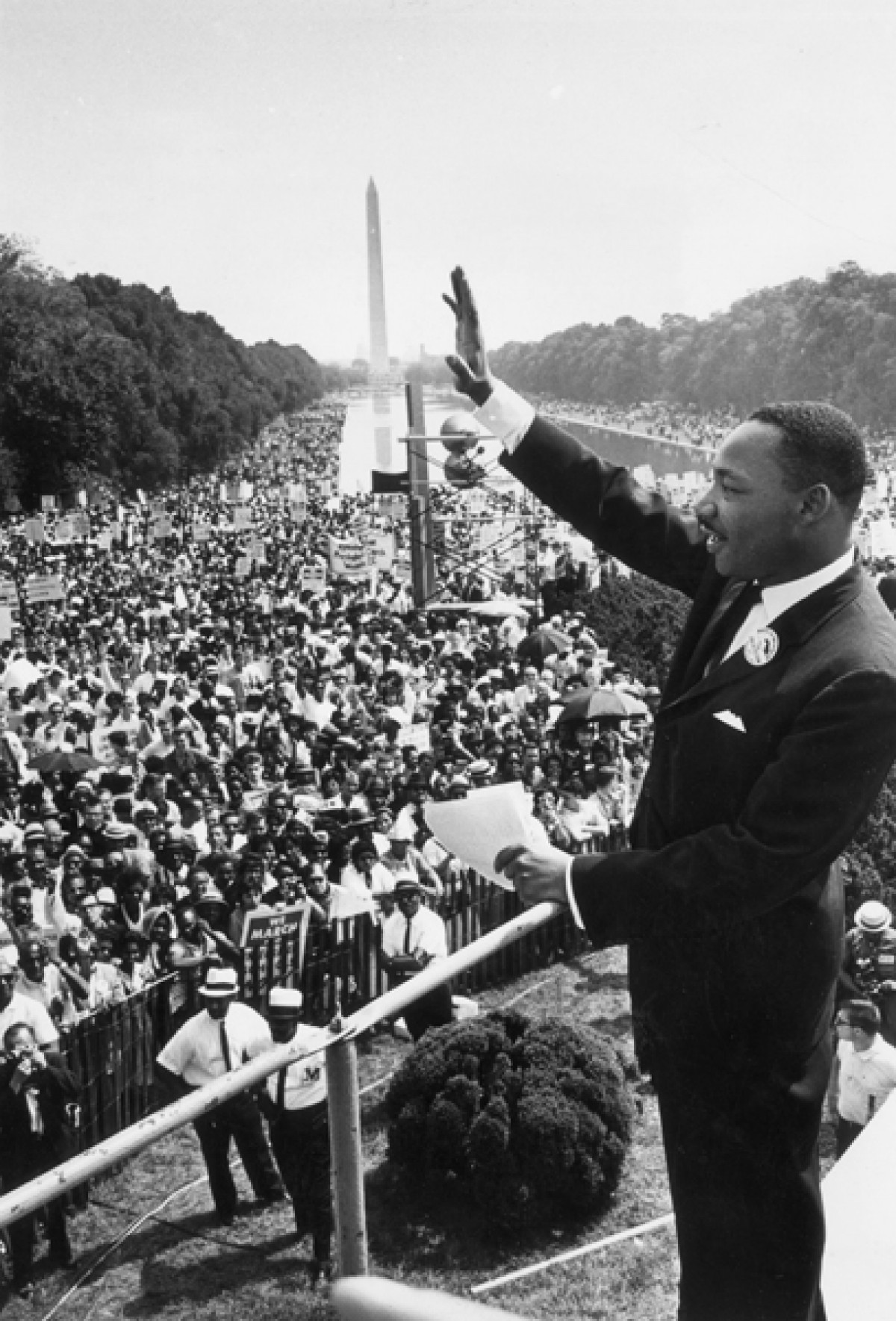
Martin Luther King greets the crowd at the Lincoln Memorial on August 28, 1963. Author: AP Published: 21/09/2017 | 05:38 pm
It was a blast, revalidating the struggle of many, raising the awareness of others and forming ranks in a social movement involving blacks and whites because it was for the civil rights of all. It also awakened those who were still lethargic after hundreds of years of outrage and submission.
On August 28, 1963, the 100th anniversary of the Emancipation Proclamation for black people in the United States, the end of slavery, was observed when a crowd, led by the Rev. Martin Luther King and other leaders of the black people’s struggle and social and labor movements, marched on Washington and gathered at the National Mall at the foot of the imposing statue of Abraham Lincoln.
“I have a dream,” he said in his speech to what he called the greatest demonstration of freedom in the history of the nation, and he called out with utter crudeness that a century later “we must face the tragic fact that the black man is not yet free. He was chained by segregation and discrimination, “living on a lonely island of poverty in the midst of a vast ocean of material prosperity,” he was “an exile in his own land.
The dream? that the words of the Constitution and the Declaration of Independence will apply to each and every American as a guarantee of the inalienable rights to life, liberty and the pursuit of happiness. These were denied to “citizens of color” who had been given a bounced check from a bankrupt justice. But this marginalized, humiliated, separated people, who were denied every opportunity, even the most basic, knew of their right to open the doors of justice, to cast aside racial injustice and to build “the solid rock of brotherhood.”
The time was urgent, warned Martin Luther King, and also alerted his people and the rest of the United States: “1963 is not the end, but the beginning” (…) “There will be no rest or tranquility in America until the black man establishes his citizens’ rights. The winds of revolt will continue to shake the foundations of our nation until the bright day of justice emerges.
Three national television networks, for the first time, covered the march for jobs and freedom in together. The message reached the entire nation that a melting pot was being said, the pot that had mixed all the peoples who had come to its shores and built a powerful country, but that was one of the great lies. The Black ingredient, even the original peoples, the “red skins”, had been taken out of society. That media coverage was proof that it was time for change.
There Joan Baez and Bob Dylan sang, as did the gospel performer, Mahalia Jackson, who carried the feeling of the crowd with I’ve Been ‘Buked and I’ve Been Scorned. Many spoke, including Joachim Prinz, president of the American Jewish Congress, recalling his years as a rabbi in Berlin under Hitler, who said – according to The Guardian – that his great people, who had created a great civilization, had then become a nation of silent spectators to hatred, brutality and mass crimes and cried out: “America cannot become a nation of spectators. America must not remain silent.”
On August 28, 1963, and Martin Luther King’s “I have a dream” speech, a door was opened. It was hardly mentioned in the 64,000 pages of debate and congressional hearings that gave way to the Civil Rights Act of 1964 or the Voting Rights Act of 1965, which put on paper what it should be and yet was not; but it was a touch of the target.
Enemies took it into account. Cointelpro, the program of espionage and infiltration into the social movements of the time, made him its target. William Sullivan, the FBI’s assistant director of domestic intelligence, recommended: “We must mark him now, if we have not done so before, as the most dangerous black man in the future of the nation.”
Hot summers came and their street uprisings, many more marches and actions, unity with the anti-war movement, and rejection of the Vietnam War, which they also used as their favorite cannon fodder for blacks and Latinos. Martin Luther King was in that fight for all.
Little by little there were achievements, even a middle class of “coloured” men and women emerged, their numbers increased in universities, they became professionals, their faces already appeared as leading figures in Hollywood films, they showed, even more, their value in the sports world, where the image of a black fist is vivid as a symbol of Black Power, the power of black people.
Blood flowed – that of Martin Luther King himself in April 1968, that of Malcolm X, that of George Jackson, that of many others – Mumia Abu Jamal is still in prison and those who chose more radical methods of struggle are being persecuted. Other leaders in an ongoing struggle were highlighted, as the Lincoln Memorial speaker said as the summer of 1963 ended: it was only the beginning…
And 50 years later, what?
Present at the rally at the National Mall on Saturday, August 24, 2013, which brought together no less than 100,000 Americans of all colors, generations and ideologies to commemorate the 50th anniversary of Martin Luther King’s oratory piece, were the parents of Trayvon Martin. He was the 17-year-old boy shot dead in the chest by a white vigilante in Florida on February 26, 2012. It took protest marches in many American cities and a lot of work to have the perpetrator arrested and put on trial, and almost now, in July, a jury of five white women and a Latina declared him “Innocent.” Not a few posters in front of Lincoln’s statue again called for justice for what is perceived as a hate crime.
Police in New York and other U.S. cities are accused of practicing stopping and frisking bystanders, most of whom are black or Latino, and preferably young, for no reason. They are stopped because of racial profiling. African-Americans make up seven times more than whites among the prison population, which is already the highest in the world. In the United States, it is known and recognized that they invest more in prisons than in schools….
Only 21 percent of their youth reach high school or college, compared to 37 percent of whites. Budget cuts in major cities declared bankrupt and in federal spending itself, that of the entire nation, affect the public school system and, of course, scholarships or university credits. It goes without saying that communities and neighborhoods where poor or low-income minorities live are among the hardest hit by teacher layoffs. During Barack Obama’s tenure alone, more than 300,000 school jobs have been lost – with a high proportion of these being African-American teachers and staff. Public education will be of even poorer quality, which means that there is no future sown there.
The unemployment rate in 2012 was 13.6 percent for the African-American work force, while the white unemployed made up 8.1 percent. Of the 45 million Americans who receive food aid because they are poor, more than 25 percent are black.
Barack Obama, the first black president of the United States will speak today, August 28, in honor of Martin Luther King. But it is well-known that the president is only an image in a House that is still white and protective of the interests of the powerful 1% against the 99% who – without distinction of race – have declared themselves in struggle and have also begun a path to close the gaps of class inequality, as the Occupy [Wall Street movement] which has been marginalized.
Now, in the southern states, even in other regions, electoral districts are being reconfigured and the black population is once again segregated from the vote, even having to pay to register. It also is the population with the lowest income, thereby discouraging voting. There is only one black senator among the top 100 in Congress, and 43 representatives in the House of Representatives, among 435…
Therefore, the validity of the thought of the civil and pacifist leader: “I have a dream: that one day this nation will rise up and live the true meaning of its creed. We hold this truth to be self-evident: All men are created equal.
Martin Luther King will continue: “Even though we face difficulties today and tomorrow, I still have a dream.”
Are Men Stronger Than Women?

Are Men Stronger Than Women?
The machismo superimposed on honesty where health is concerned, puts Latin American men, who believe that they do not need to go to the doctor, at risk of suffering serious illnesses and thus put their lives in danger.
By Juventud Rebelde
digital@juventudrebelde.cu
Posted: Saturday, March 3. 2018 | 06:54:26 PM
A CubaNews translation.
Edited by Walter Lippmann.
The machismo superimposed on honesty in health is concerned, makes Latin American men believe that they do not need to go to the doctor at risk of suffering serious illnesses and that they put their lives in danger.
Compared to other regions of the world, the health of Latin American men is more exposed to male chauvinism, believing that they are stronger than women and that they do not need to go to the doctor, puts them at risk of suffering serious and life-threatening illnesses.
This was recently announced by a study prepared by Panamanian specialists and reviewed by the Xinhua news agency.
The research explains that the decline in men’s health compared to women’s health is a global problem with great impact in our geographical area, although there is also a gap in the matter in Africa and Europe.
According to statistics, men in Latin American countries live between eight and 12 years less than women, mainly because the social stigma that considers them to be the head of the household weighs heavily on the lack of accurate reporting on men’s health.
In this region, the prevalence of certain metabolic, cardiovascular and sexual dysfunction diseases affecting men is increasingly noted.
It is common for men in this area of the planet to live less and less, and not only that, but to arrive much more deteriorated in their old age, because they never go to the doctor or have a follow-up visit.
The opposite is true of women, who, because of their preparation, are closely linked to a doctor, a pediatrician or a gynaecologist. Hence, it is the man who most often goes to the doctor with chronic illnesses.
Subscribe to Blog via Email
| M | T | W | T | F | S | S |
|---|---|---|---|---|---|---|
| 1 | 2 | 3 | 4 | 5 | 6 | 7 |
| 8 | 9 | 10 | 11 | 12 | 13 | 14 |
| 15 | 16 | 17 | 18 | 19 | 20 | 21 |
| 22 | 23 | 24 | 25 | 26 | 27 | 28 |
| 29 | 30 | |||||

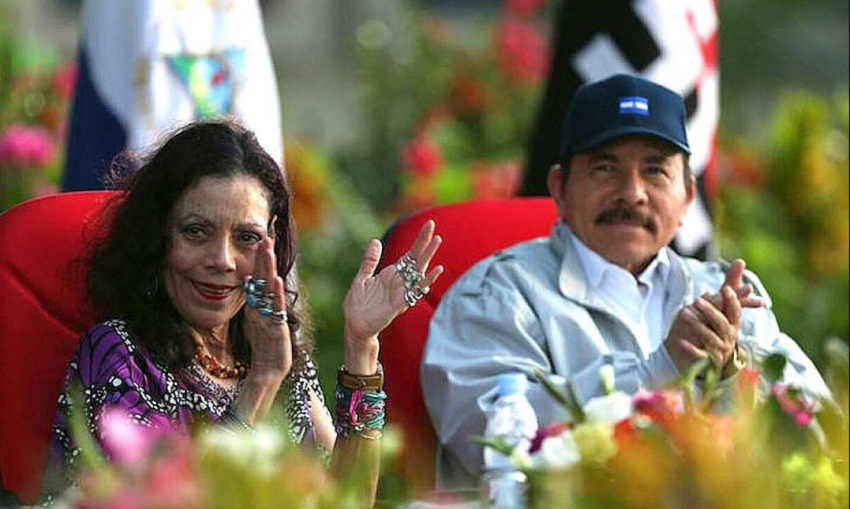

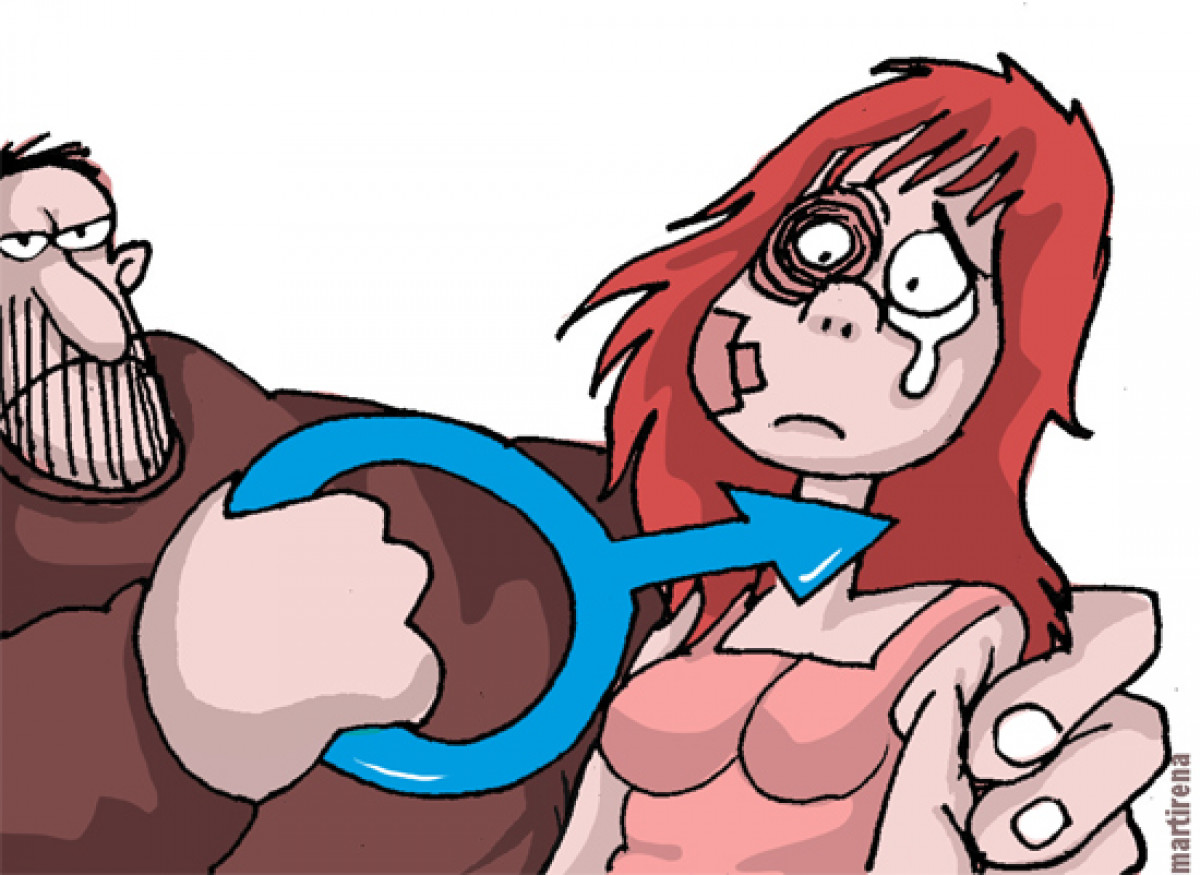



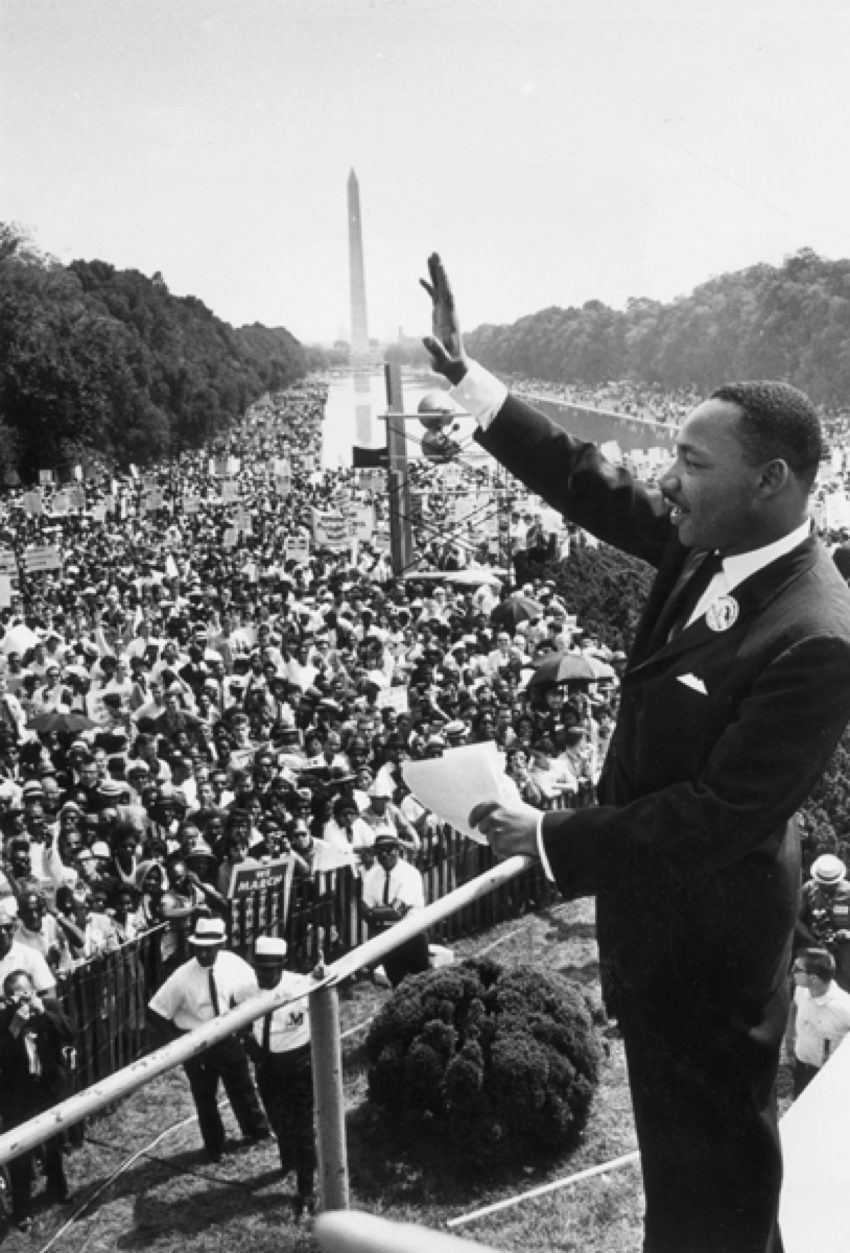
You must be logged in to post a comment.